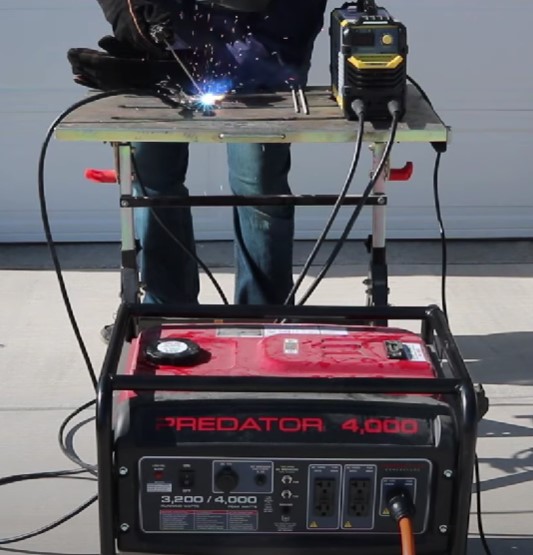A portable generator is one of the most important appliances where power outage is common. The power of a generator is measured in watts, denoting how much electricity it can produce.
Among all generator models, the 9000-watt generator is one of the most powerful machines. With such a hefty output, the big question is: what can it run?
A 9000-watt generator is a robust power source capable of running essential appliances during power outages. It can handle multiple devices simultaneously, such as refrigerators, freezers, lights, sump pumps, and heating or cooling systems. Additionally, it can power smaller appliances like microwaves, TVs, and power tools, making it a versatile option for both residential and construction needs. However, it may not be sufficient for high-demand items like central air conditioning units or large welding equipment.
In This article, we will explore the potential uses of a 9000-watt generator for home and commercial use.
What Does 9000 Watts Mean?
Before we move on to the specifics, it’s crucial to understand what ‘watt’ is.
A watt is a unit of power named after Scottish engineer James Watt. It quantifies the rate of energy transfer. In the context of generators, wattage indicates the power they can deliver.
Generators have two power ratings:
- continuous or running watts
- peak or starting watts.
Continuous watts represent the generator’s ability to continuously power your devices, while peak watts cater to the initial extra surge required to start motor-driven appliances.
To give a clearer perspective on what 9000 watts entails, consider this – a typical household uses around 5000-7000 watts of power daily.
Estimating Power Requirements for Common Appliances and Tools
Every electrical device or appliance requires a certain amount of power to function. Here’s a brief rundown on the average wattage requirements of some standard machines:
- Household Appliances: Refrigerators (600-800 watts), central air conditioners (2000-5000 watts), heating systems (500-1500 watts).
- Power Tools: Drills (600-900 watts), saws (1000-2000 watts), welders (4000-9000 watts).
- Electronics: TVs (150-200 watts), computers (200-400 watts), gaming systems (120-200 watts).
- Miscellaneous: Lights (60-600 watts), charging devices (20-200 watts), medical equipment (300-1000 watts).
You can calculate the total power requirement of your setup by adding the wattage of all the appliances you plan to use simultaneously.

Which Home appliances can you run with a 9000-watt generator?
In a typical home, a 9000-watt generator can power during outages, ensuring your vital appliances stay running. For instance, it can simultaneously power a refrigerator, a few lights, a heating system, and a TV. It could also run larger appliances like a central air conditioning unit if used strategically.
For recreational purposes, a 9000-watt generator can be a handy companion for camping trips or RV vacations, allowing you to use a microwave, small air conditioner, or portable heater.
What can you run with a 9000-watt generator from a Commercial perspective?
On a construction site, a 9000-watt generator could power multiple high-wattage tools such as saws, drills, and a welder. It could run lighting, audio equipment, and small cooking appliances for outdoor events or catering.
FAQ On What Will a 9000-Watt Generator Run?
How long will a 9000-watt generator run on propane?
The runtime of a 9000-watt generator on propane largely depends on the fuel tank’s capacity and the load at which the generator operates. Typically, generators consume more fuel and run for shorter periods when used at higher loads.
On average, a 9000-watt generator might consume around 1 to 1.5 gallons of propane per hour when operating at full load. However, it’s important to note that this is a rough estimate, and the actual consumption will vary based on the specific model of the generator, its efficiency, and the appliances it’s powering. If your generator has a 20-pound propane tank (which holds about 4.7 gallons of propane) running at full capacity, it may run for roughly 3 to 5 hours.
But if you’re running the generator at half load, the run time can double. Refer to your generator’s user manual for specific details about fuel consumption and estimated runtimes.
For prolonged usage, using a larger propane tank or having additional tanks for replacement can be a practical solution. Propane is a clean-burning fuel with a longer shelf life than gasoline, making it a preferred choice for many generator users.
How many amps will a 9000-watt generator run?
The number of amps a 9000-watt generator can produce depends on the voltage you’re using. Generally, in the U.S., residential electricity is typically supplied at 120 volts for smaller appliances and lighting circuits and 240 volts for larger devices like ovens or electric dryers.
Using the formula for calculating amps (Amps = Watts / Volts), a 9000-watt generator operating at 120 volts can produce 75 amps, while at 240 volts, it can produce approximately 37.5 amps. However, these are theoretical maximums, and actual outputs can be lower due to factors like efficiency and power factor.
Also, remember that the generator should not be run at its maximum capacity for extended periods, which could lead to overheating and potential damage.
Related Posts:
- Will 2000-watt Generator Run Skill Saw or Circular Saw?
- What Will 1000 Watt Generator Run?
- What Can 1400 Watt Generator Run?
- What Can 3000-watt Generator Run? (Complete Guide!)
- What Will 12000 Watt Generator Run? (With Calculation)
Will a 9000-watt generator run central air?
A 9000-watt generator can run a central air conditioning unit, but the exact capability depends on the specific power requirements of the air conditioner.
Typically, a central air conditioner can use anywhere from 2,000 to 5,000 watts of power per hour when running, but the starting wattage can be much higher due to the initial power surge when the compressor kicks in. This surge can be up to three times the running wattage.
Most modern central air conditioning systems for an average-sized home require between 3000 and 5000 watts when running, so a 9000-watt generator could handle this load comfortably. However, it’s essential to consider other appliances or systems in your home that you may need to power simultaneously with the AC unit.
Also, running your generator at total capacity for extended periods can lead to overheating and wear, so it’s best to manage power usage efficiently. Refer to your air conditioner and generator’s user manuals for wattage requirements and capabilities.

How long will a champion 9000-watt generator run?
The runtime of a Champion 9000-watt generator largely depends on the fuel type used and the load at which the generator operates.
Champion’s dual-fuel generator with a 9000-watt peak power rating can run up to 8 hours at 50% load on a full tank of gasoline (usually about 6 gallons). When powered by a 20-pound propane tank, the same generator could run up to 5.5 hours at 50% load.
These are approximate values; actual run times can vary based on the specific model and the generator’s efficiency.
Remember, managing power usage efficiently can extend the runtime. Instead of running multiple heavy appliances simultaneously, consider rotating their usage or using only the essential ones. This practice not only conserves fuel but also prolongs the generator’s lifespan.
Will a 9000-watt generator run a welder?
A 9000-watt generator can typically run a welder, but it will depend on the specific power requirements of the welder. Welders vary significantly in size and power needs, ranging from small units requiring as little as 1000 watts to industrial units requiring 10,000 watts or more.
For example, a 140-amp welder used at maximum capacity usually requires approximately 6000-7000 watts. In contrast, a 180-amp welder used at total capacity could require around 8000-9000 watts. In these cases, a 9000-watt generator should be sufficient.
However, it’s important to remember that generators also have surge wattage ratings, representing the maximum wattage the generator can handle for short periods, such as when a motor-driven appliance like a welder starts up. Ensure that your welder’s running and surge power requirements do not exceed the generator’s ratings.
Finally, bear in mind that if you plan to power other tools or appliances simultaneously with the welder, you’ll also need to account for their power needs. Always refer to the user manuals of both the generator and the welder for specific power requirements and capabilities.

Will a 9000-watt generator run a heat pump?
Whether a 9000-watt generator can run a heat pump depends on the specific power requirements of the heat pump.
Generally, heat pumps can require anywhere from 2,000 to 5,000 watts of power to operate, depending on their size, model, and efficiency. Some larger, high-capacity heat pumps may require even more. However, like many appliances, heat pumps often require more power to start up than to run continuously. This starting or surge power can be significantly higher than the running wattage and must be considered when sizing a generator.
A 9000-watt generator should have enough capacity to run many residential heat pumps. However, it’s important to remember that this doesn’t account for any other appliances or systems in your home that you may need to power simultaneously.
Always refer to your heat pump and generator’s user manuals for exact wattage requirements and capabilities. If the power requirements of your heat pump and any other appliances you need to power simultaneously are close to or exceed the generator’s capacity, consider a more significant generator to prevent overloading.
Final Thoughts
A 9000-watt generator is a valuable and versatile machine capable of powering many appliances in residential and commercial settings. Its ability to provide substantial power makes it an excellent option for those looking for reliability and versatility in planned events and unforeseen circumstances. Knowing what such a generator can handle helps users make informed decisions about their power needs, ensuring efficiency and safety.
Recent Posts
Yes, synthetic oil can generally be used in generators. It offers superior lubrication, improved resistance to temperature variations, and longevity compared to conventional oil, which can enhance...
In today's digital age, our dependency on computers and other electronic devices is undeniable. But what happens when a power outage occurs? This is where generators come in. However, is it safe to...
